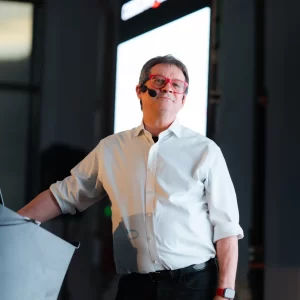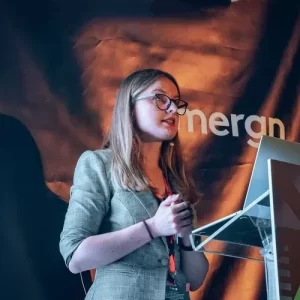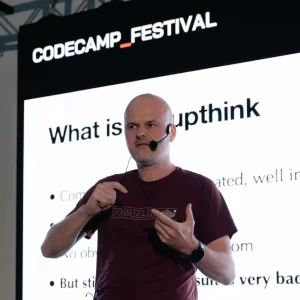Codecamp_Festival
The Saga Continues... in Iasi
24 October 2024 _ Agora Center Iasi, Romania
A complete experience
16 superheroes
2 top-notch keynotes
3 stages
New connections
Food and drinks
Concert & afterparty
Codecamp_Festival is a one-of-a-kind experience, mixing learning from the best speakers out there, from all over the world, with the glitz and glamour of an actual music festival.
Three incredible stages, two inspiring keynotes, seeing your superheroes up close and personal and making new connections, in a laid-back and friendly scenery, who said learning can’t be fun?
The speakers
Meet the superheroes that changed the game in software development.
Yeap, they’re all coming to Romania! Grab a coffee with them and prepare to be starstruck.
The stages
Woodstock
Factory
Portal
Holiday Village
Masterclasses
Main Partner

Tremend
Tremend is the CEE software engineering hub for Publicis Sapient, part of the Publicis Groupe. For 20 years, the company has been infusing its advanced technical expertise into complex and innovative solutions that meet today’s digital transformation needs and pave the way for a better and smarter future.
Through its advanced expertise in strategy and implementation for complex software projects, innovation programs, and product management, Tremend has proven itself as one of the most dynamic players in the global software development market.
The company specializes in providing consulting, strategy, and implementation services for complex software solutions, innovation programs, and product management for companies in various industries, including telecom, finance, banking, automotive, and healthcare, in more than 20 countries.
Stage Partners

E.ON Software Development
E.ON Software Development is a Technology Consulting division within E.ON’s Digital Technology organization. As a partner for our businesses, our division makes a major contribution as an internal professional services organization to accelerate the delivery of E.ONs Digital Transformation Strategy. E.ON is a leading European utility company, playing a key role in shaping the energy transition and connecting everyone to good energy.

HTEC
HTEC is a global digital product development and engineering services firm powering the technological evolution of the world’s most impactful organizations through end-to-end services. Founded in 2008 in Belgrade, Serbia, the company is now headquartered in San Mateo, with more than 2,000 experts spread across the traditional engineering hotspots of Central and Southeast Europe and consulting, innovation, and product design offices in Silicon Valley, New York, and London. With the highest level of expertise and extensive experience in a multitude of business domains – including Healthcare, Retail, Transportation and Smart Mobility, Logistics, FinTech, Green Energy, Media, and Deep Technology – HTEC is both an ideal technology partner for its clients and the ultimate growth platform for its employees.
Expo Partners

MassMutual
MassMutual Romania is a technology partner of MassMutual, a leading financial services company in the U.S., with a legacy of more than 170 years. Established in 2020, the Romanian company is building an in-house team passionate about technology and innovation. We have expertise in software development, data science and a wide range of technologies. With offices in Bucharest and Cluj, and team members across the country, MassMutual Romania develops technological solutions that help MassMutual accelerate its digital capabilities and enable it for the next stage of growth in the digital-first world.
MassMutual Romania has been named Top Employer by Undelucram.ro, for a second year in a row, ranking on the 1st place of the IT&C sector for 2023, and second in the general market.

Amazon
At Amazon we are striving to delight our customers and make their life easier. Amazon is guided by four principles: customer obsession rather than competitor focus, passion for invention, commitment to operational excellence, and long-term thinking. We are driven by the excitement of building technologies, inventing products, and providing services that change lives.
With a presence in Iasi, Bucharest and Timisoara, Amazon Romania has a vast presence in tech roles. Highly skilled experts of Amazon tech teams work on exciting cutting-edge technologies in the fields of Cloud Computing, Information Security, Machine Learning and Data Analysis.
On October 24th, @Codecamp Iasi, you will meet CoSS, Security, Privacy, CBA and Store Presentation Foundation teams:
• Compliance Shared Services (CoSS) team researches, innovates, advances the state-of-the-art, and builds ML systems to proactively identify safety and compliance risks in Amazon’s retail business.
• Stores Security is responsible for any human access to data at Amazon and enables governance bodies and all service owners to raise the security bar by restricting access to data on a fine-grained basis.
• Privacy is responsible for creating and operating large scale, Amazon wide Privacy oriented services and tooling, giving global Amazon customers an easy and transparent way to exercise their right to know what data is stored about them and their “right to be forgotten”.
• Customer Behaviour Analytics (CBA) is responsible for ingesting and processing big data sets of website and mobile traffic and interactions, in order to identify and understand customer behaviour, thus creating multi-million-dollar business opportunities allowing Amazon strong and sustained growth rates.
• Store Presentation Foundation (Content Creation) supports a variety of businesses with marketing systems that elevate the customer experience, by building tools that enable marketers to create in a self-service or automated way measurably effective, compelling customer experiences across Amazon’s owned and operated channels.

Cognizant
Cognizant Romania is one of Eastern Europe’s largest Software Product Engineering delivery networks. We serve global clients in several industries, including Banking & Financial Services, Insurance, Healthcare & Life Sciences, Communication Media & Technology, and Retail & MLEU (manufacturing, logistics, energy & utilities).
Our product thinking mindset defines, builds, and launches new, experience-centered software products that reinvent business.
To learn more about Cognizant Romania and explore career opportunities visit our website (https://www.cognizant.com/ro/en)!

EPAM
EPAM Systems, Inc. is a leading digital transformation services and product engineering company. We are committed to having a positive impact on our customers, our employees, and our communities and are working closely with our clients to help them become digital at their core —transforming not only their technology strategy, but also business, design and operations to run smarter and faster in markets that are continually facing technology change. At EPAM Romania we are working fully remote, in multi-national teams, we are contributing to innovative projects that deliver creative and cutting-edge solutions and have an opportunity to continuously learn and grow. No matter where you are located, you will join a dedicated community that will help you reach your fullest potential. Discover how we do IT!
https://www.youtube.com/watch?v=HXsj50oJ1vA

Orange Services
Orange Services was created in 2013 and is a 100% owned subsidiary of Orange Group. As a technology services company, our DNA is in IT, but our teams also work in other domains including mobile networks and a number of commercial and business functions. Orange Services is one of the largest technology hubs in the Orange Group, working internationally for both Orange corporate functions and country operations.
Through a unique combination of cutting edge know-how and expertise, our teams provide a broad range of services: development and supervision of IT services (in domains such as Big Data, Cloud, M2M, IoT, TV, Connected Objects, …), design and development of IT infrastructure and desktop solutions, testing & planning for mobile networks, implementation of supply chain solutions and also improvement of commercial & business performance (BI, CRM, Analytics, Digital learning, Customer Care, …).
Visit us at: https://www.linkedin.com/company/orange-services

Wiley
Wiley is a trusted leader in research and learning, our pioneering solutions and services are paving the way for knowledge seekers as they work to solve the world’s most important challenges. We are advocates of advancement, empowering knowledge-seekers to transform today’s biggest obstacles into tomorrow’s brightest opportunities.
With over 200 years of experience in publishing, we continue to evolve knowledge seekers’ steps into strides, illuminating their path forward to personal, educational, and professional success at every stage. Around the globe, we break down barriers for innovators, empowering them to advance discoveries in their fields, adapt their workforces, and shape minds.

CREATEQ
Create custom software powered by your creativity and latest technology
Welcome to CREATEQ, a Swiss software engineering company with around 300 professionals who have been shaping our culture for more than 20 years. Specializing in custom software, we deliver tailored solutions for clients in aviation, energy, fintech, retail, advertising, and more across the UK, Germany, Switzerland, and Austria.
At CREATEQ, you’ll join a diverse, multicultural team spread across Switzerland, Serbia, Romania, Moldova, and Morocco. Our distributed teams integrate closely with clients, enabling smooth project collaboration. By working in similar time zones and with complementary cultures, we enhance communication and efficiency—leading to better project outcomes without the hassle of late-night meetings.
We’re committed to staying ahead of the curve by investing in our people. Through continuous learning and the adoption of modern AI tools, we empower our teams to work smarter and more efficiently, giving you the tools to thrive in innovative projects.
Ready to be part of a team where creativity and technology come together?
Explore career opportunities at: www.createq.space/careers/

Societe Generale Global Solution Centre
Societe Generale Global Solution Centre is a business solution center for Societe Generale, one of the largest European financial groups. We provide high-quality professional services for more than 35 countries in various fields of activity –Information Technology, Finance & Accounting, Human Resources, Know Your Customer, Compliance. Our mission is to build together a better and sustainable future through responsible and innovative solutions. Our diverse and flexible work environment offers the means to learn and develop for both experienced and young professionals. Here you will find the resources to continuously learn and improve your skillset (or, why not, to explore a completely different career path) through international exposure, transversal projects, numerous learning platforms or internal mobility opportunities.

HCLTech
HCLTech is a global technology company, home to more than 223,400 people across 60 countries, delivering industry-leading capabilities centered around digital, engineering, cloud and AI, powered by a broad portfolio of technology services and products. We work with clients across all major verticals, providing industry solutions for Financial Services, Manufacturing, Life Sciences and Healthcare, Technology and Services, Telecom and Media, Retail and CPG, and Public Services. Consolidated revenues as of 12 months ending June 2023 totaled $12.8 billion. To learn how we can supercharge progress for you, visit hcltech.com.

ROStartup
ROStartup is the representative and cohesive force of the Romanian startup ecosystem. Acting as an umbrella for the ecosystem, we bring together startup enablers organizations from Romania.
We offer a blend of capacity-building programs, policy advocacy, internationalization efforts, and financial support mechanisms – all aimed at cultivating a nurturing environment that propels the growth and global visibility of the Romanian Startup Ecosystem.
Community Partners

IT School
IT career accelerator!
Develop your potential and step into the IT universe!


Calemis
We’ve been making entrepreneurial waves in Iași since 2013 through events where people put their business ideas in the spotlight.
We’re a handful of people passionate about building a strong entrepreneurial community in Iași. Startup Weekend, IdeaJAM and Innovation Labs are the events you might know us from.
Our mission is to connect all the wild idea-people with an implementation team, mentors and, hopefully, investors.

Voxxed Days Iasi
These developer conferences bring together popular speakers, core developers of popular open-source technologies and professionals willing to share their knowledge and experiences. With several tracks on different topics, attendees can satisfy their curiosity and learn new skills while enjoying and having fun!

Scoala Informala de IT
The Informal School of IT is the largest platform in Romania that brings together industry leading professionals with talented people driven by a desire to develop their unique IT skills.
Our hands-on approach, combined with a permanently updated curricula and convenient timeframe proved to be a successful recipe for our alternative school.

People of Tech
People of Tech is a growing community for entrepreneurs and intrapreneurs.

Innovation Labs
Are you a young visionary that aims to build a tech start-up?
Join us to turn your tech vision into a product through fine-tuned mentorship, access to bleeding-edge technologies and interaction with top companies, mentors and angel investors.
Are you an innovative company looking to connect with the most vibrant innovation ecosystems?
Join the main university-based tech start-up accelerator program in Romania – and be part of a network that fosters innovation, collaboration and digital transformation.

IASI AI
IASI AI community started from the desire to increase the awareness of artificial intelligence and its applications among technology enthusiasts through meetups and workshops, creating a favourable context for promoting local ideas and initiatives.

RubikHub
Rubik Hub is more than a physical place, it is an emerging community, formed of people with mutual values, a desire to grow and a common VISION: live in a world where each person can reach the best version of themselves and drive positive impact.
We embarked on a brave MISSION, to develop and connect communities, together with whom we inspire, educate and accelerate startups from 0 to 1 and create global successful businesses.

Startup Moldova
Startup Moldova is the platform that provides support for accelerating the development of startup initiatives and technological innovations at home in the Republic of Moldova
Media Partners

TechEvents
TechEvents is a free mobile app that brings together all the important tech events in the industry, with the aim of supporting the harmonious development of the IT community in Romania.

Romania Pozitiva
Good things about Romania.
Welcome to the positive information and education platform, RomâniaPozitiva.ro!

DevJob.ro
DevJob.ro is the first Romanian IT job board built with Software Engineers in mind.
Our goal is to bring more transparency, openness and diversity to the Romanian IT market.
We want to make the job search process for Software Engineers more enjoyable by gathering all job postings in Romania and presenting them in an informative way.
Our portal is not only for Developers but for everyone working in the IT industry: Engineers, SAP and System Admins, Product Managers, QAs and UX/UI Designers!


IQool

ITPrenori

How About Tech
Welcome to How About Tech, your go-to source of valuable insights and innovative ideas in the world of technology. Our mission is simple: to deliver insightful tech news with unwavering objectivity and lightning speed. We understand the need for timely and impartial information in today’s fast-paced tech landscape, and we’re here to meet that demand.
































